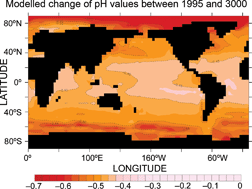Ocean acidification: a millennial challenge
Abstract
During recent decades, Earth system research has provided overwhelming evidence that climate change, with disastrous consequences, will result from unbridled anthropogenic emissions of greenhouse gases. It is well accepted among climate scientists that these emissions, especially of CO2, may force the planet to warm by up to seven degrees C by the end of the century. During recent years, however, a second comparably dangerous consequence of steadily increasing atmospheric


 Please wait while we load your content...
Please wait while we load your content...